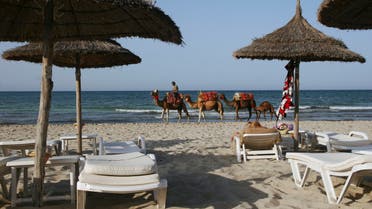From beaches to dunes, the shifting sands of Tunisia’s tourism industry
In a bid to boost tourism figures, which nosedived during the 2011 revolution, Tunisians are taking things into their own hands
Tunisia is re-branding itself as an affordable tourist destination offering chilly Europeans sun, sea and sand. But that’s not all, it is also hoped the long held connection with the Star Wars franchise will help draw visitors inland to the desert.
In a bid to boost tourism figures, which nosedived during the 2011 revolution, Tunisians are taking things into their own hands, turning to social media to market their country.
“Je serai en tunisie le” (French for “I will be in Tunisia on”) is a Facebook page set up for tourists who plan to visit the country. All they have to do is share a picture of themselves holding a placard reading “Je serai en tunisie le (date)” onto the Facebook page.
Tourists who happen to be in Tunisia are also encouraged to share photos with placards that read “Je suis deja en (location in Tunisia)” (French for “I am already in”).
“I wanted to show the reality in Tunisia. I wanted to show that tourists are indeed visiting Tunisia using a very simple concept,” Zied Chargui, the founder of the page, told Al Arabiya News.
“I wanted to help my country. I wanted to show that we don’t need to wait for the state to change things; we can change things,” Chargui said.
The initiative is also meant to exhibit Tunisia’s hidden landscapes and historic ruins as well as inform tourists of upcoming cultural events and festivals.
“The global economic crisis, in addition to the security situation of Tunisia’s neighbors, have indirectly affected the country’s tourism industry and allowed the media to talk about Tunisia in an inaccurate way.”
“Let’s speak about Tunisia in a different way; not the way that the media uses,” Chargui, who is also the director of the National Office of Tunisian Tourism, said.
And he added that tourists from all over the world were enthusiastic to share their experiences on the Facebook page.
Chargui was also behind the 2014 viral music clip “Happy (We are from Tatooine),” featuring various Star Wars characters moonwalking to Pharrell Williams’ hit song “Happy” in the Tunisian desert.
The rural town of Tataouine was one of the major settings for the movie franchise and what inspired the Star Wars authors to adopt the town’s name in the movies (Tatooine is the home planet of Luke Skywalker).
The music video was the brainchild of Star Wars Tunisia - a fan club that aims to save town from being gobbled up by the desert sands but also attract tourists to the southern region.
While the sandy beaches remain the backbone of the country’s tourism market, the Tunisian tourist authorities are moving inland focusing on the sand dunes as a possible additional site for tourist activities.
Les Dunes Electroniques, a three-day music festival, based in the Star Wars set of Nefta, is believed to have attracted approximately 5,000 visitors to Tunisia’s Sahara.
The Mediterranean country has for decades been known for its “golden beaches, sunny weather and affordable luxuries,” and as a “bargain tourist destination” that attracted at least five million tourists annually (with a record seven million in 2010) - up until the revolution.
But tourism figures continue to disappoint, despite most travel warnings having been dropped - and the capital Tunis also making it into the National Geographic Traveler 20 go-now destinations for 2015.
Official reports put the number of tourist arrivals in Tunisia in January 2015 down by 10 percent compared to the same period in 2010.
“Tourism activity in Sousse dropped in recent years because of the national and regional conditions the country is facing,” said Saloua Guedri, the regional commissioner of tourism in Sousse.
“Sousse used to work the entire year. Tourism in Sousse has become only seasonal,” said Guedri adding that this coastal city makes up to 20 percent of national tourism.
“The tourism industry in Tunisia suffers from two types of problem: conjectural and structural,” said Hassen Ben Jenana, an artisanship shop owner and a professor of finance.
He said the revolution had created a perception of the country that it was unsafe.
“The revolution and its aftermath constitute the conjectural problem now,” Ben Jenana said, adding that security is one of the main concerns for tourists.
“And security is not related to terrorism only, but also theft. The conjuncture is difficult,” he added.
In 2013, a suicide blast on a beach resort in Sousse, one of the most popular tourist destinations, shook the already ailing tourism industry. The attack, which is believed to have been carried out by the Salafist extremist group Ansar al-Shariah, was the first of its kind in more than a decade.
In 2002, a natural gas truck filled with explosives was detonated at the entrance to a Jewish synagogue in the island of Djerba –popular with tourists - killing 21 people, including 14 Germans.
The 2002 attack has harmed the market for German tourists, and has changed the “quality of tourists,” said Ben Jenana, who is also a former hotel administrator.
“Germans stopped coming. And Germans spend money.”
He said that the problem extended across many Northern European countries, with their populations choosing not to visit Tunisia.
“These nationalities were replaced with Eastern Europeans and Russians. And these people do not have the purchasing power,” he added.
The so-called all-inclusive packages adopted by both hoteliers and giant international tour operators have further harmed tourism revenues, said Slim Akrout, a general director at a hotel and a tourism expert.
“The tourist can pay 400 euros [$433] for a week-long stay, including plane tickets and food.”
“It’s not Tunisians who decide. It is neither the ministry of tourism, nor the Tunisian Hotel Federation, nor the Tunisian Federation of Travel Agencies,” added Akrout.
“This sector is controlled by international tour operators. And the Tunisian state is the one to take the hit because hoteliers can no longer pay their debts,” said Akrout, adding that the sector is “drowning” even more.

Unlike its North African neighbors, Tunisia is deprived of natural resources making tourism the backbone of the country’s economy.
As of 2010, tourism revenues were estimated to account for approximately seven percent of Tunisia’s gross domestic product (GDP).
Tourism is also a vital driver of employment, engaging about 400,000 people (direct and indirect employments), and of foreign currency earning.
A shaky tourism industry is therefore a direct blow to an already-ailing Tunisian economy.
Concerned about the dropping numbers of tourists visiting after the revolution, hoteliers further decreased their prices to attract travelers. But this also harms the economy, claimed Ben Jenana.
“Many hotels were built with bank credit. Prices are so low that hoteliers are not making more than 5 percent profit and are no longer paying their debts.”
“As a result many development banks went bankrupt,” said Ben Jenana, adding that while this issue started before the revolution, it had worsened.
Looking at the Sousse beach strip, Ben Jenana said many of the most popular hotel chains in the country had already announced bankruptcy and closed their doors.
To solve the hotel business problems, hoteliers need to unite and decide on prices, said Akrout.
Despite the issues, Guedri said: “Looking at some positive indications, I am hopeful. I hope our country stabilizes and gets back on track. It is not that difficult. What we need is willingness and hard work.”
-

Anti-femicide play in Tunisia marks International Women’s Day
The theatrical project, which comprised of a collection of monologues, aimed to ... Art and culture -

Tunisia appeal to CAS over Nations Cup sanctions
CAF also fined Tunisia $50,000 and banned referee Rajindraparsad Seechurn for six ... Sports -

Tourist arrivals to Tunisia down by 21 percent: report
The number of tourist arrivals in Tunisia in January 2015 was down by 21 percent ... Economy -

Democracy under way, Tunisia turns to tough economic agenda
Tunisia has been praised as an example of compromise politics and democratic ... Analysis -

Tunisia consider response to CAF demand for apology
If Tunisia does not apologise to the Confederation of African Football, they will ... Sports -

Tunisia turns to Star Wars to boost tourism
A huge screen broadcasted scenes from the Star Wars films as crowds snapped photos ... Featured Perspectives -

Cruise operator suspends Tunisia stops after Israelis barred
An official at Tunisia's tourism ministry said the visitors were prevented from ... Travel and Tourism -

Tunisia’s tourism minister resigns over 2006 Israel trip
Amel Karboul says she was not able to enter Israel due to problem at Tel Aviv ... Middle East -

Tunisian activists take to the streets with art
A group of Tunisian activists use street arts to get their message across Featured Perspectives -

The writing’s on the wall: Tunisian graffitist talks art and uprisings
'Calligraffiti' on a mosque? This artist has done it by merging calligraphy with ... Art and culture

